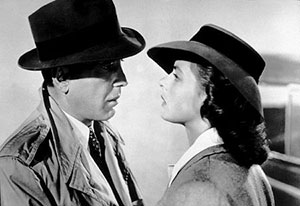
Since a lot of people think that audiences want a happy ending, screenwriters often feel compelled to have their protagonist get what they set out to get at the start of the film. Sure, giving the protagonist what they want can sometimes deliver a commercially successful film but it will rarely deliver the profoundly moving transcendent ending.
Consider Raiders of the Lost Ark. Indiana wants to beat the Nazis to the Lost Ark of the Covenant, and, at the end of the film, that’s what he gets. By the end of Act 1 in Jaws, Sheriff Brody wants to kill the shark, and, at the end, he blows that thing to smithereens. In There’s Something About Mary, Ted (Ben Stiller) sets out to get the eponymous female and, after the odd bad hair moment, that’s what transpires.
These are all hugely popular films and I like all of them, but are these endings profoundly moving? And, by “profoundly moving”, I mean, do they move you to tears? I’ve never seen anyone sobbing when I turn up the lights after watching the end of Raiders. These films are satisfying, they are cathartic, but they lack this transcendent quality I’m talking about.
In an earlier post, I challenged this idea that audiences want happy endings. Or unambiguously sad endings. What I argued was that what really tends to move us is an ending that reminds of both the exquisite pleasure and the unendurable pain of life. I called this feeling “Ecstatic Agony“.
It’s going to be difficult for you to produce the melancholy dimension of this ending – the Agony in Ecstatic Agony – if the Hero gets what they set out to get. On the contrary, it generally means they must lose – or, better still, relinquish – this thing that was most precious.
At the start of Dead Poets Society, Todd wants to be small, insignificant and unnoticed, and his wish plainly doesn’t come to fruition.
At the beginning of One Flew Over the Cuckoo’s Nest, R.P. McMurphy wants to be released from his prison term for statutory rape and he foregoes that opportunity.
For a good hour in Schindler’s List, Oscar wants to become wealthy beyond his wildest dreams and he does, but then trades it away for the lives of the workers.
In Casablanca, Rick gives up two things he previously sought – his detachment from the war and the love of his life, Ilsa.
In Tootsie, Rocky, The Apartment, Strictly Ballroom, Lars and the Real Girl, Little Miss Sunshine, and The Lives of Others, similarly, the protagonist does not get (or does not retain) what was absolutely vital to them earlier.
And yet all of these films have moving endings. Why does the hero NOT getting what they want work our emotions?
It could be because most of us know, or are starting to suspect, that we won’t get the things we’re seeking, and we need to get comfortable with that.
Or – and I think this is closer to the truth – we know that achieving goals in the external world – titles, fame, money, success, glory, sexual conquests – very rarely delivers the feelings we hope for. If we’re lucky, the thing we’ve hotly pursued – the championship, the job, the award, the car, the cute girl/guy – will deliver some pleasure on attainment, but its satisfactions rarely endure. We’re left wanting something more …
Which leads us to my next post …
Great Endings Step 2: Hero should get something more valuable
Join the Cracking Yarns mailing list
Learn about our Screenwriting Courses
Learn about our Online Screenwriting Courses
Learn about our Free Screenwriting Webinars
Learn about our Script Assessment options
Subscribe to the Cracking Yarns YouTube channel